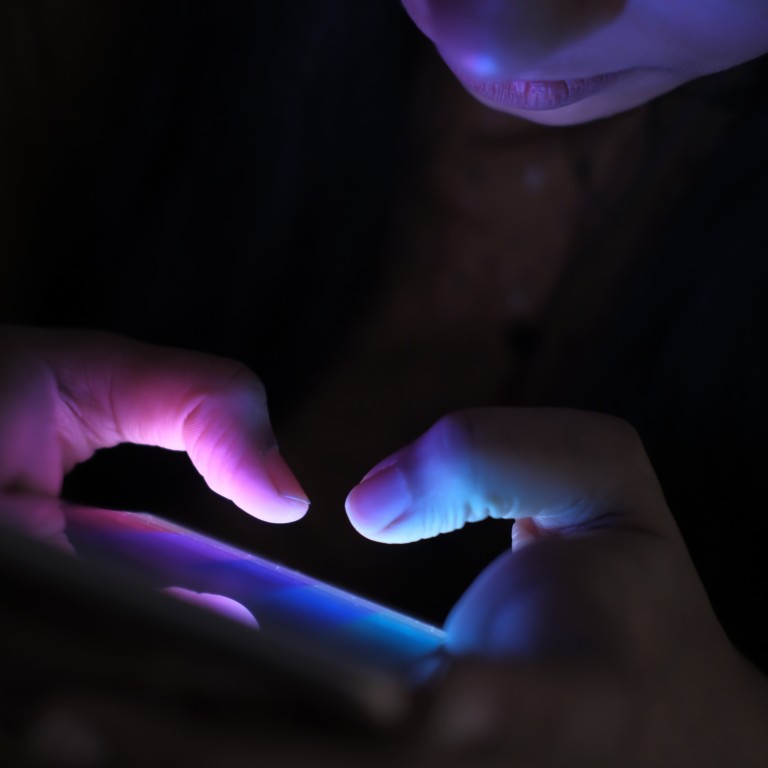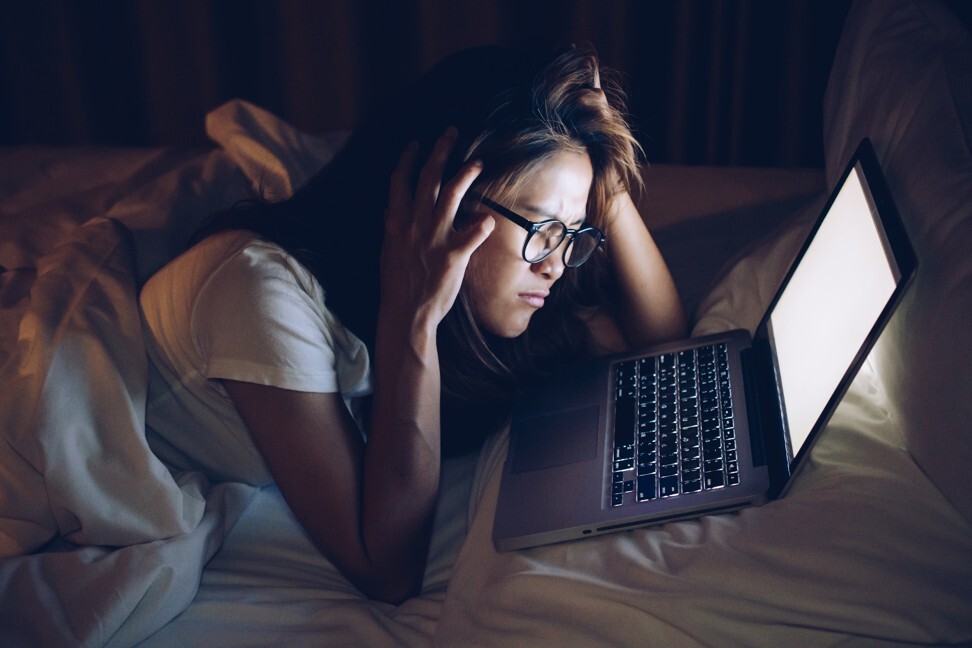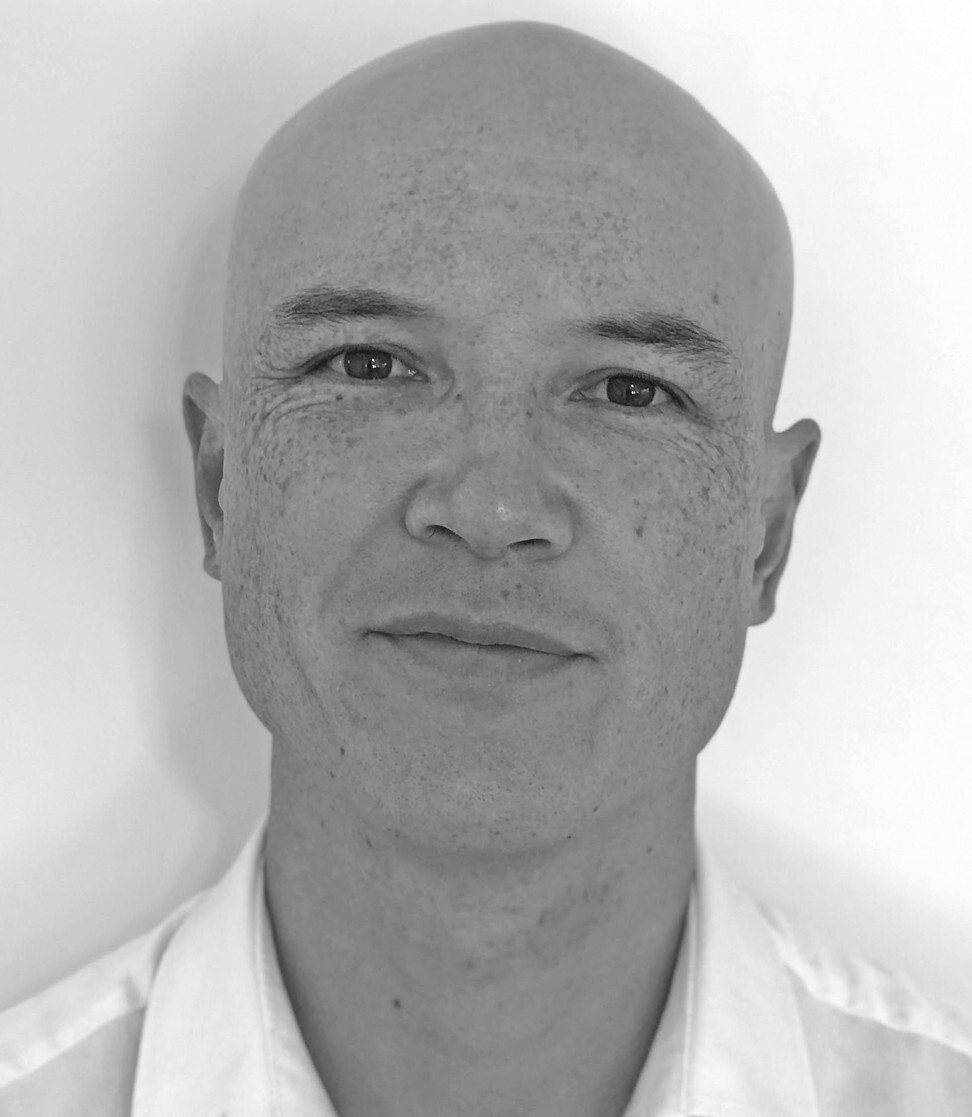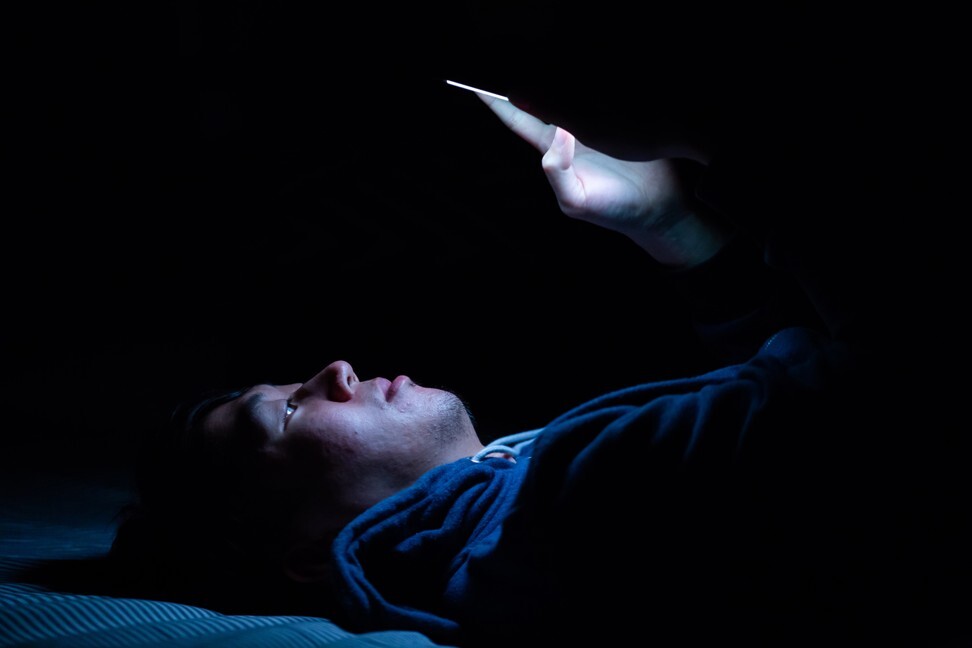
How to stop blue light from devices ruining your sleep – and skin
- Blue light from our many devices can pose several health risks, the biggest being the disruption of our sleep cycle
- Eyeglasses that block blue light and physical filters that cover screens can help, while mineral-based sunscreens can help negate the effect on skin
After lawyer Kam Dhaliwal realised how much of her life in Hong Kong revolved around staring at digital screens, she bought a pair of blue-light-blocking eyeglasses. The HK$300 (US$39) purchase from a local ophthalmologist required no prescription, and she quickly came to appreciate their value.
A casual discussion with her friends had helped her recognise she might be harming her eyes by spending long hours poring over legal documents on-screen at work. The 29-year-old was also mostly going online for entertainment, too. When she googled for ways to protect her eyes, these special antiglare glasses seemed a good idea.
We tend to think of tired eyes as a chronic malady of our times – an inevitable reality of increased screen and gadget use. But the real problem, experts say, is the source and quality of our lighting.

“The cells in our eyes are more sensitive to some light waves, particularly blue/green spectrum light; computer screens and device screens emit quite powerful blue light spectrum light,” says Dan Ford, a behavioural sleep psychologist at the Better Sleep Clinic in New Zealand.
Research shows that using our devices at night could suppress the production of melatonin, a hormone that plays a critical role in inducing sleep. This could increase wakefulness at night and lead us to stay up longer and get less sleep; it could also affect our sleep quality with less “dream” sleep, and affect next-day alertness, Ford says. Being aware of the overall light level from our devices and shutting them off an hour before bed can help improve sleep quality, he adds.

Blue-light-blocking glasses don’t help normal sleepers sleep better, but they can help insomniacs, Ford says, citing research. Normal sleepers and insomniacs have different physiologies, so what works for one cannot be assumed to work for the other. If you do try blue-light-blocking glasses, Ford recommends orange lenses that block more light spectrum than yellow ones.
If you don’t want to wear glasses, and it isn’t possible to spend less time in front of screens, then adjusting the nature of lighting on your devices can help.
When London-based Helen White, co-founder of home improvements retailer Houseof.com, which specialises in lighting, started working from home, she began spending much more time using screens as she was working extra hours during time she would otherwise be commuting.
“My ability to fall asleep and my sleep quality was noticeably worse. I realised that the amount of blue light I was being exposed to had increased significantly and it was having a detrimental impact upon my daily energy levels,” she says.
Using her software’s blue light filter, or “night mode”, helped. Most operating systems come with blue light filters, White says. If you use an Apple device, consider activating “Night Shift” throughout the day. Microsoft users can adjust blue light emissions via the settings tab. Many brands also make physical blue light filters that you can place over your screen and are equally effective, White says.
“My goal for 2021 is to focus on managing my energy better and getting eight hours of high-quality sleep a night,” she says.
Blue light at night, not overall device usage, is the main problem, though. “I wouldn’t expect to see a negative impact on sleep from device usage during the day,” Ford says. “Just focus on the evening device usage as evening bright light is the main issue.”

As a father, Ford knows getting youngsters to comply can be hard, but it’s important as a child’s eyes cannot filter as much blue light as adults’ can. With three children, aged 18, 14, and 5, Ford says the entire family makes a conscious choice to avoid screens in the evenings.
“Over lockdowns we tried to have a schedule of family evening activities to keep kids off devices – board games and indoor games,” he says.
The sun is a source of natural blue spectrum light, but this kind is beneficial, experts say. The quality of natural blue light that you are exposed to during the day could also affect your sleep cycle.
Some office design takes this into consideration. Two architects from ZGF Architects in the US state of Oregon wrote a study on how to optimise work environments so that workers’ eyes get the most light, and the right light, at the right time for optimal circadian functioning. Being exposed to more light during the day means better sleep, cognition, mood and productivity, the study says.
[Blue light] can contribute to collagen loss which can lead to your skin losing its elasticity and the formation of wrinkles
Marty Brennan, one of the study’s authors, says arranging your office space so that you’re looking towards light is beneficial. “The more indirect and/or visually comfortable light sources in your view, the better,” he says. “This includes windows, overhead lighting, computer monitors, task lights and light reflecting off walls. Orienting your desk properly towards your closest light makes a huge difference.”
It helps if a room has neutral, reflective materials. “Surfaces that reflect light will improve light levels. This can be the determining factor between meeting your light quota or not,” Brennan says.
He explains that in an age of personal health and fitness trackers, many people keep a close watch on measures like the number of steps they take and the quality of our sleep. “But how often do we ask, ‘Did I get enough light before lunch?’ Although our study was meant to inspire healthier office designs, there are some great takeaways for home offices as well.”

It’s not just your eyes that are affected by light emitted from devices. “Blue light can induce oxidative stress in the skin, causing the generation of free radicals that can age skin,” says Jill Canes, a nurse and founder of the Face Forward Medical Aesthetics spa in the US state of Massachusetts.
A study published in Science showed that exposing skin to blue light can induce more redness and pigmentation compared to the sun’s UVA rays.
“It can contribute to collagen loss which can lead to your skin losing its elasticity and the formation of wrinkles,” Hayes says. “It can also contribute to hyperpigmentation and brown spots on the skin. The effects are not immediately noticeable, but can accumulate over time. Many sunscreens contain zinc oxide and titanium dioxide that protect you from UVA and UVB rays but they don’t offer as much protection against visible light such as blue light.”
Mineral-based sunscreens can help, she adds. “Ideally, sunscreens that contain iron oxide and antioxidants are a good choice as they can block out visible light and protect your skin from free-radical damage.”

